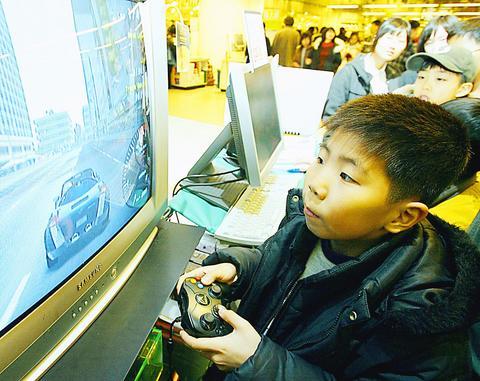In the online computer game Lineage, 12-year-old South Korean Lim is a hero, earning fame and fortune in a fantasy world where a flashing blade and well-timed spell can keep him out of trouble.
In the real world, however, Lim's love affair with the fantasy game saw him fall foul of the law after he stole US$16,000 from his father and ran away to feed a passion for online gaming.

PHOTO: REUTERS
"The boy told us he wanted to play games to his heart's content, so he decided to leave home," said police officer Jung Sang-won, who tracked down Lim in Busan, South Korea's main port city, last month.
The 12-year-old -- police have identified him only by his family name -- was discovered at an Internet cafe, known in South Korea as a PC Baang.
Lim's case highlights some of the growing social problems that have emerged with South Korea's drive to capitalize on a powerful broadband network and expanding online game market, now estimated to be worth almost 500 billion won (US$420 million) a year.
The game fanatic's whereabouts were discovered when he cashed some of his father's checks at a bank in Busan and tried to transfer the equivalent of US$300 to a fellow gamer in exchange for cyber gaming items.
Successful players can earn huge sums of money by collecting virtual items like magic potions or enchanted swords in multi-player games such as Lineage and then selling them for real cash to other players.
Concerns over growing illicit trade in cyber items, as well as health fears over the length of time young people spend on games, have driven the government to draft regulations to cope with the darker side of South Korea's appetite for online gaming.
About 70 percent of South Korea's 48 million people have access to the Internet, with 11 million using high-speed services, the world's highest broadband penetration rate.
NCsoft Corp, the company behind Lineage, generated revenue of about 111 billion won in the first nine months of the year, earning 22 billion won in net profit.
Local rival Webzen Inc generated net profit of 25.3 billion won on sales of 42.2 billion won, and raised US$97 million by selling shares in the US in December as part of an overseas expansion strategy.
The boom in online gaming has spawned 24-hour cable channels broadcasting professional gaming events and fan clubs for gaming superstars that draw tens of thousands of members.
"I spend usually 10 hours in front of a computer every day to prepare for game contests and study strategies to win," said a professional gamer, Kim Ka-eul. Kim, 25, heads a team of 19 gamers and makes a living through corporate sponsorship and prize money from gaming contests and other events.
"Some professional gamers are as young as 13 and there are more than 50 pros starring on gaming channels on a regular basis," she added. "One superstar even has a fan club with more than 100,000 members."
While online gaming offers exciting new career opportunities for a few, some social experts have expressed concern about how gaming is taking over the lives of young South Koreans.
A poll by the Commission on Youth Protection showed 60 percent of 1,440 juveniles surveyed said they believed they were addicted to online gaming and the Internet.
"One 25-year-old unemployed man confessed he had once sat up three straight nights to win game items in order to sell them back to other players for real money," Hwang Jang-min, a researcher at Yonsei University, said in a research report.
The man said he made almost US$1,400 by selling them.
Committed players devote between 17 and 26 hours a week to online games, the most popular of which demand hours of concentration and the ability to go without a bathroom break or food for extended periods.
In extreme cases, game addicts have collapsed and died after playing for hours, consuming nothing but soda and instant noodles.
Local media has reported six deaths related to online gaming since late 2002, including a gamer who killed his sister after becoming confused between the online world and real life.
"In most cases, heavy game players show the same kinds of problems -- they do badly at school, have problems with their friends, family and teachers, and even play truant from school," said Lee Su-jin, a counsellor at the Center for Internet Addiction Prevention and Counselling, established by the government in April 2002.
"We receive reports of some 30 new troubled cases every week but the numbers keep rising. Parents are only now becoming aware of the seriousness of the problem."
But given that more than 16 million households are hooked up to the high-speed Internet network, and some 25,000 Internet cafes across the country charge only 1,000 won per hour for broadband access, imposing a regimen of cold turkey on teen game fanatics is no easy task.
And while some game industry alliances have been pushing game makers and distributors to provide purchasing guidelines, the likelihood of authorities imposing regulations that may pull the plug on a lucrative 500 billion won industry seems unlikely.
"Neither the game makers nor the government are fully prepared to tackle the problems once and for all, given their relatively few years' experience in the online gaming sector," said Lee Wang-sang, an analyst at LG Investment & Securities.

Taiwanese chip-making giant Taiwan Semiconductor Manufacturing Co (TSMC) plans to invest a whopping US$100 billion in the US, after US President Donald Trump threatened to slap tariffs on overseas-made chips. TSMC is the world’s biggest maker of the critical technology that has become the lifeblood of the global economy. This week’s announcement takes the total amount TSMC has pledged to invest in the US to US$165 billion, which the company says is the “largest single foreign direct investment in US history.” It follows Trump’s accusations that Taiwan stole the US chip industry and his threats to impose tariffs of up to 100 percent

On a hillside overlooking Taichung are the remains of a village that never was. Half-formed houses abandoned by investors are slowly succumbing to the elements. Empty, save for the occasional explorer. Taiwan is full of these places. Factories, malls, hospitals, amusement parks, breweries, housing — all facing an unplanned but inevitable obsolescence. Urbex, short for urban exploration, is the practice of exploring and often photographing abandoned and derelict buildings. Many urban explorers choose not to disclose the locations of the sites, as a way of preserving the structures and preventing vandalism or looting. For artist and professor at NTNU and Taipei

The launch of DeepSeek-R1 AI by Hangzhou-based High-Flyer and subsequent impact reveals a lot about the state of the People’s Republic of China (PRC) today, both good and bad. It touches on the state of Chinese technology, innovation, intellectual property theft, sanctions busting smuggling, propaganda, geopolitics and as with everything in China, the power politics of the Chinese Communist Party (CCP). PLEASING XI JINPING DeepSeek’s creation is almost certainly no accident. In 2015 CCP Secretary General Xi Jinping (習近平) launched his Made in China 2025 program intended to move China away from low-end manufacturing into an innovative technological powerhouse, with Artificial Intelligence

From insomniacs to party-goers, doting couples, tired paramedics and Johannesburg’s golden youth, The Pantry, a petrol station doubling as a gourmet deli, has become unmissable on the nightlife scene of South Africa’s biggest city. Open 24 hours a day, the establishment which opened three years ago is a haven for revelers looking for a midnight snack to sober up after the bars and nightclubs close at 2am or 5am. “Believe me, we see it all here,” sighs a cashier. Before the curtains open on Johannesburg’s infamous party scene, the evening gets off to a gentle start. On a Friday at around 6pm,